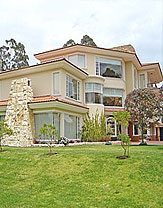Rent control, automatic contract renewal
The Ecuadorian law is moderately PRO-TENANT. The rights given by the law in favor of the tenant cannot be waived.
Rents: Can landlord and tenant freely agree rents in Ecuador?
The initial rent can be agreed between the landlord and tenant, but with one limitation. The Registry of Rents in each city sets maximum chargeable rents, determined by calculating the twelfth part of 10% of the commercial cost of each property, which is set by each City Council.

Normally, rents agreed by contract cannot be increased until the end of the contractual term. However, the landlord may request an increase in the rent, before the Registry of Rents, when the property has gone through improvement works, or when two years have gone by since the last time rent was agreed between the parties.
The law does not allow for any increase in the rents due to increases in cost of living.
Deposits
Security deposits, as well as rent deposits, are commonly used as a tool in tenancy contracts, though Ecuadorian tenancy law makes no mention of the concept of security deposits.
What rights do landlords and tenants have in Ecuador, especially as to duration of contract, and eviction?
The minimum duration for a rent contract is two years. There are three exceptions to this rule:
- When a person rents a room at a hotel or any other place in the same line of business;
- When an individual and/or a family have to move transitorily from one city or town of residence to another;
- When the rented property is directed to the organization of an exhibition, show or any other event that, by nature, has a short duration.
 When the landlord wishes not to renew the contract, he/she has to inform the tenant ninety days in advance. If no such notification is given, the contract will automatically extend for one more year. After the expiration of this one year extension, either landlord or tenant may terminate the contract by informing the other party about his/her will to cease the contract with one month in advance to the expected day of effective termination.
When the landlord wishes not to renew the contract, he/she has to inform the tenant ninety days in advance. If no such notification is given, the contract will automatically extend for one more year. After the expiration of this one year extension, either landlord or tenant may terminate the contract by informing the other party about his/her will to cease the contract with one month in advance to the expected day of effective termination.
The law states that the duration agreed in tenancy contracts must be observed by both parties. However the landlord can terminate the contract before the agreed term on some specific grounds:
- When the tenant is two periods late with the rent, at date when landlord files suit against tenant;
- When there is grave danger of destruction of the area of the rented building;
- When the tenant causes uproar or chaos;
- When the tenant uses the property for any illegal purpose, or any purposes different than the one agreed by contract;
- When tenant causes damage to the building or its installations and does not carry out immediate repairs;
- When the tenant sub-rents or sells property without the landlord's authorization;
- When the tenant does works in the property which have not been authorized by the landlord;
- When landlord decides to demolish the building in order to construct a new building. The tenant, in this case, has to receive three months' notice of his eviction, before the scheduled date of demolition;
- When the landlord justifiably decides to move to the property, if she does not have another property to go to;
- When the landlord sells the property. In this case the landlord has to give the tenant at least three months notice before eviction;
The tenant may terminate contract at will only when the contract does not specify a term, or when the contract is verbal (not written); the tenant must give at one month's notice of his intent to terminate before his date of departure.
Legislation
 The applicable law for tenancy contracts relating to property located in urban perimeters is the Law of Tenantship (Ley de Inquilinato, R.O. 196, of Nov. 1st, 2000). Subsidiarily, for urban property, and for tenancy contracts of rural property, the applicable law is the Civil Code (R.O. Sup. 46, of June 24, 2005) and the Code of Civil Procedure (R.O. Sup. 58, July 12, 2005).
The applicable law for tenancy contracts relating to property located in urban perimeters is the Law of Tenantship (Ley de Inquilinato, R.O. 196, of Nov. 1st, 2000). Subsidiarily, for urban property, and for tenancy contracts of rural property, the applicable law is the Civil Code (R.O. Sup. 46, of June 24, 2005) and the Code of Civil Procedure (R.O. Sup. 58, July 12, 2005).
How effective is the Ecuadorian legal system?
Tenancy disputes are solved by special tenancy courts in cities, and by civil courts in any other part of the country. These disputes are solved by a summary process, which in reality is as slow as the ordinary process. On average, a dispute before a tenancy court will last from 6 to 10 months, if there is no appeal; and up to a year and a half, if there is an appeal.
Brief history: Recent changes in Ecuadorian landlord and tenant law
The current Ecuadorian Law of Tenantship is the result of reforms and minor amendments of the 1972 law. The spirit of both documents is the provision of living facilities for all citizens. Some critics argue that the current law is not sufficiently protective of the less favored people.